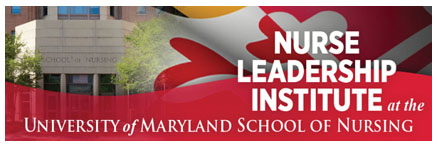Online Course
Nurs 787 - Theory Teaching and Learning
Module 8: Professional Development
Service and Scholarship
A final aspect of professional development is a nurse educator’s responsibility to participate in service and scholarship.
Service might include serving on unit, department, campus, hospital, or system-wide committees. A faculty member could represent his/her school at a policy meeting or a statewide education initiative. Service also includes mentoring. One example of service is shown in this statewide Nurse Leadership Institute mentoring program (funded by Maryland Higher Education Commission NSP II grant funding) and led by the University of Maryland’s Professional Education department. Watch their video here.

Other service possibilities include holding office within a specialty organization, sitting on a Board, serving as a volunteer, panelist, preceptor, or guest lecturer. The possibilities are limitless.
Scholarship can include collaborations, presentations, publications, and other forms of dissemination. An educator could partner with a clinical colleague to develop online modules about a particular topic, for example, or present at a board meeting or national conference. Dissemination is critical to the advancement of best practices in teaching and nursing education! Whether clinical, simulation, online, or classroom settings, dissemination to one’s peers is critical!
Conferences often require an abstract for poster or podium presentations. This brief webinar from the American Organization for Nursing Leadership (AONL) describes the process for "How to Write a Compelling Abstract".
This article describes the 4 Ps of Professional Posters, and offers some tips on how to create an eye catching and memorable poster. (Bindon, S. L., & Davenport, J. M. (2013). Developing a Professional Poster Four “Ps” for Advanced Practice Nurses to Consider.AACN advanced critical care,24(2), 169-176). 10.1097/NCI.0b013e318287a3fb
Writing for publication can seem daunting to nurse educators who have not had that experience. Common barriers to writing include time, difficulty focusing the topic, choosing a journal, and having a mentor or support. A good first step is to read several journals to see which might be a fit for your idea and topic, and then writing a simple query to the editor. You might be surprised at their quick and helpful reply!
This free, helpful course, "Writing for Professional Journals", from Dean Patricia Morton at the University of Utah School of Nursing, via the Robert Woods Johnson Foundation, gives a wonderful overview and tips for authors.

What aspects of your scholarship would you like to develop? Have you presented or published? What support do you need, or who can serve as a mentor? If you are experienced, who can you help to achieve their goals?
This website is maintained by the University of Maryland School of Nursing (UMSON) Office of Learning Technologies. The UMSON logo and all other contents of this website are the sole property of UMSON and may not be used for any purpose without prior written consent. Links to other websites do not constitute or imply an endorsement of those sites, their content, or their products and services. Please send comments, corrections, and link improvements to nrsonline@umaryland.edu.